|
Who doesn't love a good courtroom drama? Okay, I'm guessing a few hands shot skyward just then, but if that includes you then you may think there is no point reading any further as the film under examination here is just such a beast. But before you depart, note that there's plenty more to recommend it. It was, after all, based on a play by Agatha Christie, whose speciality was carefully constructed murder mysteries peppered with surprising and sometimes outrageous twists. And it was directed by Billy Wilder, a filmmaker whose CV is littered with extraordinary works and a handful of genuine classics. On the basis of those two facts alone I'd suggest that even if you're not usually a fan of this particular subgenre, Witness for the Prosecution should be worth your consideration. Still not convinced? Well, know also that it stars the magnificent Charles Laughton at the top of his game, and if that little triumvirate doesn't pique your interest just a little then I'm done with you. Honestly, it's your loss, as while there are definitely greater Wilder films out there, there are few that are more unreservedly entertaining and I've only scratched the surface when it comes to what makes this film so special.
Laughton plays veteran barrister Sir Wilfrid Roberts, who as the film opens is heading back to his office following his hospitalisation for a heart attack. He has been advised by his doctor not to take on any criminal cases and is accompanied by Miss Plimsoll (Elsa Lanchester), a relentlessly upbeat private nurse employed to administer Sir Wilfrid's medicines and prevent him from indulging in his passion for brandy and cigars. He is just coming to terms with the idea that he should not stress himself out with the criminal cases for which he has built a formidable reputation when his solicitor friend Mayhew (Henry Daniell) turns up with one that he insists Sir Wilfrid hear. He is accompanied by American ex-serviceman Leonard Vole (Tyrone Power), who has been charged with the murder of wealthy older widow Emily French (Norma Varden), whom he met by chance and who grew fond enough of him to make him the main beneficiary in her will. Sir Wilfrid is intrigued, especially when Vole passes his ‘monocle test' (he grills him whilst reflecting the sun from his monocle into Vole's eyes to see if he falters when protesting his innocence), and though he initially declines on health grounds and assigns it to his colleague Brogan-Moore (John Williams), after a meeting with Vole's frostily cool wife Christine, he decides to handle the case himself.
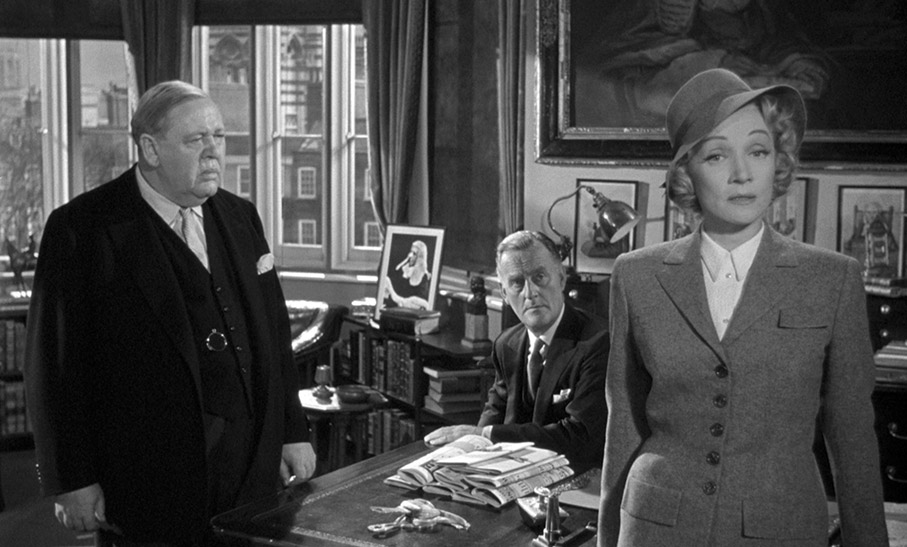
As an introductory summary, I realise that the above is not exactly littered with enticing hooks, so I should probably give those who are new to the film an idea why it so quickly draws you in. Actually I can do in five words – character, performance, dialogue, script and direction. Sure, you would expect these five boxes to be ticked for any movie worth it's salt, but for the first half-hour or so, before the plot moves into a higher gear, they really are everything. The character introductions are all object lessons. We first meet Sir Wilfrid and Miss Plimsoll in the back of a car as they are driven to the London law firm at which Sir Wilfrid is the senior partner. As played by Charles Laughton and his then wife Elsa Lanchester, Sir Wildfred and Miss Plimsoll are a riotous double-act that brings a gloriously comic edge to every scene in which they interact. The comically upbeat Miss Plimsoll talks to Sir Wilfrid as she might a small child, fussing over him in a way that prompts grouchy and sarcastic responses that fail to impact on her cheer or deflect her attentions. This results in a handful of priceless exchanges. "2.30 Sir Wilfrid. Time for our little nap!" chirps Miss Plimsoll at one point, then adding, "Beddy-bye! We'd better go upstairs now, get undressed and lie down," to which Sir Wilfrid responds with a look of disgust, "We? What a nauseating prospect." It's also during these establishing scenes that Sir Wilfrid delivers some of his most enjoyable lines, my favourite of which has to be, "I am constantly surprised that women's hats do not provoke more murders."
As played by former matinee idol Tyrone Power, Vole has an instantly likable quality, initially only vaguely aware of the trouble he is in and initially willing to accept Sir Wilfrid's help not because of desperation on his part but because he trusts the word of his solicitor. Savvy casting and the confident body language and precise line delivery of Henry Daniell and personal favourite John Williams ensure that Mayhew and Brogan-Moore convince from the off as trustworthy men of the legal profession, and there's typically colourful work from Una O'Connor as Emily French's grumpy Scottish maid Janet MacKenzie. But the best entrance of all is made by Marlene Dietrich as Christine, seemingly appearing out of nowhere after overhearing a conversation about her husband and effortlessly selling her character as someone you wouldn't ideally want to rely on in court but whose coldly delivered alibi for Vole is the cornerstone of his defence. Given that Miss Plimsoll was the invention of Wilder and co-screenwriter Harry Kurnitz and much of the dialogue and even some of these establishing scenes were also of their invention, I can't imagine that the first act of the play was anything like as entertaining.
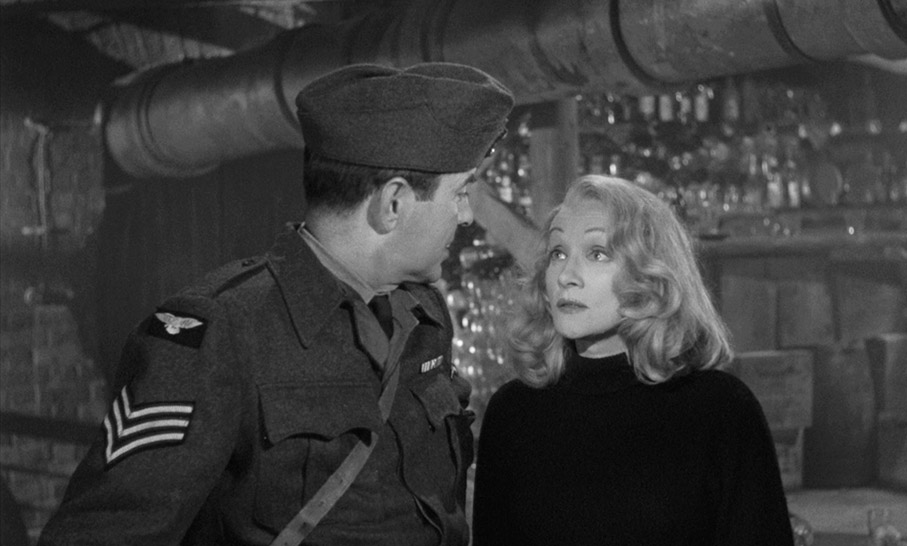
That the film never feels like a stage adaptation is down in part Wilder's use of multiple locations and particularly to three flashback scenes in which Vole recalls how he met Christine at the end of WW2 and how he met and got to know Emily French, sequences that all kick off with Vole looking wistfully into space as the camera moves towards him and he begins his recollection. That's not a criticism, but by the third one I was starting to become aware of Wilder's otherwise invisible technique, which of course is when he chose to call it quits and move on. Elsewhere he is able to milk a gag for all it's worth without overextending its welcome, notably anything involving the stairlift chair installed by Sir Wilfrid's loyal assistant Carter (Ian Wolfe), which Sir Wilfrid initially scorns but quickly takes to and employs to drift in and out of conversations and repeatedly frustrate the fussing of Miss Plimsoll.
We're fifty minutes in before the court case begins at the Old Bailey (probably the most famous court in the country, for those unfamiliar with the name), but this is where most of the subsequent action takes place, and yet still Wilder manages to shake off the project's theatrical origins (it actually began life as a short story, but the script is a direct adaptation of the play) and through purposeful camera placement and editing ensure it remains very much a cinematic experience. I'm not going to get into detail about the case itself as this is where Christie's talent as a structuralist really shines, but will confirm that it has all of the traditional rewards, including unpleasant surprises, sharp rebuffs, small moments of triumph and well-timed objections, plus a handful of twists that are nigh-on impossible to predict on a first viewing. What lifts this above many a solid courtroom drama are its memorable character moments, the lion's share of which rightly belong to Laughton: the bustle with which he arrives late to court on the first day due to a medical examination, only to blast out an objection just seconds after taking his seat; his seemingly distracted arrangement of his pills into a grid while the prosecuting barrister Myers (Torin Thatcher) presents his case; the comically theatrical manner in which he takes his prescribed tablet as Miss Plimsoll looks on protectively from the gallery; his now famous interrogation of a witness that is peppered with scornful comments and concludes with the explosive delivery of the word, "LIAR!"
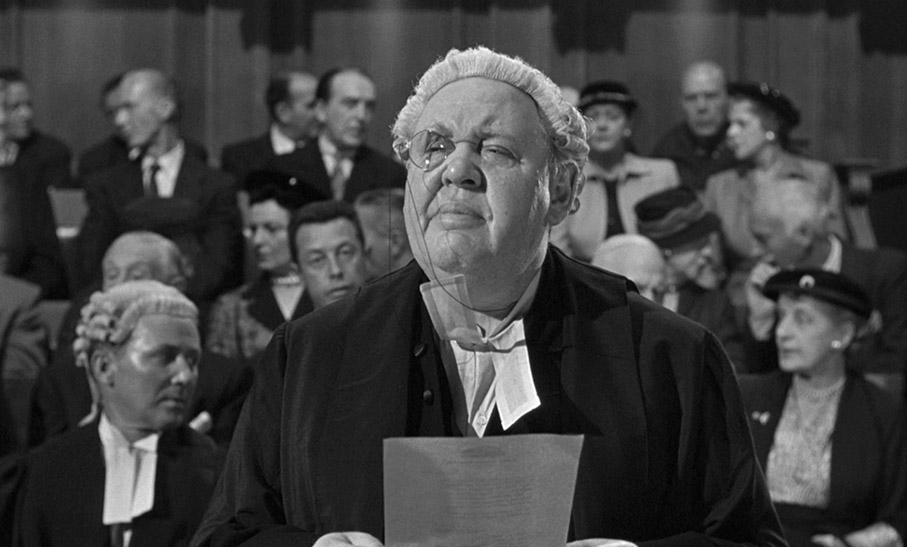
There is one interlude that takes Sir Wilfrid and Mayhew out of the courtroom in pursuit of new evidence, and a related twist that all these years after I first saw it now seems transparently obvious, but which I recall being completely fooled by on my first viewing and which I can't discuss in any detail without potentially ruining it for first-timers. Even if you do see through the deception, it's still easy to admire the scene in question for the artistry and sheer nerve of its execution, and you'll still probably caught out by the multiple twists that follow. It all builds to a dramatic but ultimately moving ending, one that touchingly settles a personal feud and leaves us to speculate on what the future may hold for the individuals concerned.
When discussing Billy Wilder films there's always the danger of judging them against each other instead of on their own often considerable merits, which is possibly why Witness for the Prosecution rarely gets mentioned in the same breath as the likes of Double Indemnity, The Lost Weekend, Sunset Boulevard, Ace in the Hole or The Apartment. There are, of course, good reasons why those particular films are repeatedly singled out as exemplars in a career of extraordinary works, but for sheer unadulterated, plot-twisting fun, Witness for the Prosecution is hard to beat.
Don't be put off by the slight softness of the opening wide shot of this splendid 1.66:1 1080p transfer – this is a process shot onto which the titles have been overlaid and thus cannot be sourced from the original negative without recreating and recompositing the opening credits, and that would never do. When the film proper gets under way the detail is wonderfully crisp, enlivened further by punchy but never over-aggressive contrast, where the black levels are beefy and the pleasing tonal range is particularly kind to faces and clothing textures. As you would expect of a modern restoration, almost all dust spots and traces of wear have been eliminated (some faint flickering is still visible on rare blank empty areas of frame such as skies) and there is no errant movement of the image in frame.
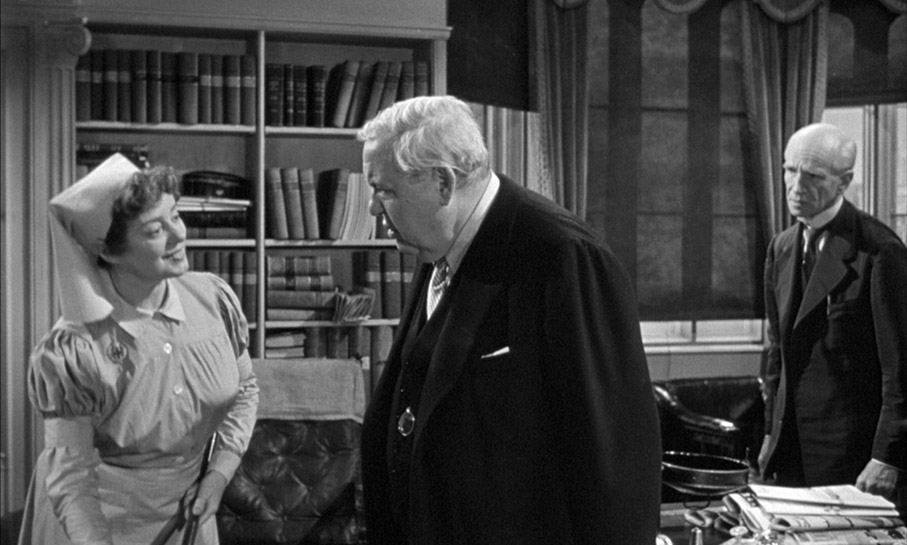
The Linear PCM 2.0 mono soundtrack is very clear and has a more generous dynamic range than you might expect on a film of this vintage, and there is no background fluff or hiss or evidence of damage.
Optional English subtitles for the deaf and hearing impaired are available.
Kat Ellinger Audio Commentary
I always enjoy Kat Ellinger's contributions to Eureka, Arrow and Indicator discs, in part because she talks like I do rather than sounding like my local MP, but primarily because she carries so much information in her head about everything she is invited to speak about, and communicates it in a clear and interesting manner. 20-minute interviews are one thing, however, but could she keep the pace up for a full two hours? You'd better believe it. There's barely a pause here and a ton of information on Wilder, his career, this film (one of her favourites), the cast and more is delivered over the course of two enthralling hours. There is intriguing identification and examination of recurring themes within Wilder's oeuvre, the news that Wilder wanted Kirk Douglas to play Vole after Tyrone Power initially turned the part down (I'm a fan of Douglas, but just can't see him working as well as Power here), a persuasive argument for the popularity of courtroom dramas at this time, specifics on Laughton, Dietrich and Power, with some discussions going into considerable detail. An excellent extra.
Monocles and Cigars: Simon Callow on Charles Laughton (16:07)
Another production from Robert Fischer's Fiction Factory, this interview with Laughton biographer Simon Callow is captivating from the off due to Callow's unbridled enthusiasm for his subject. As you would expect, Laughton and his performance in Witness for the Prosecution is the focus here, with details provided on Laughton's personal life and his troubled relationship with Elsa Lanchester, praise for an adaptation that he believes "improves immeasurably on the play," and some revealing titbits about the making of the film.
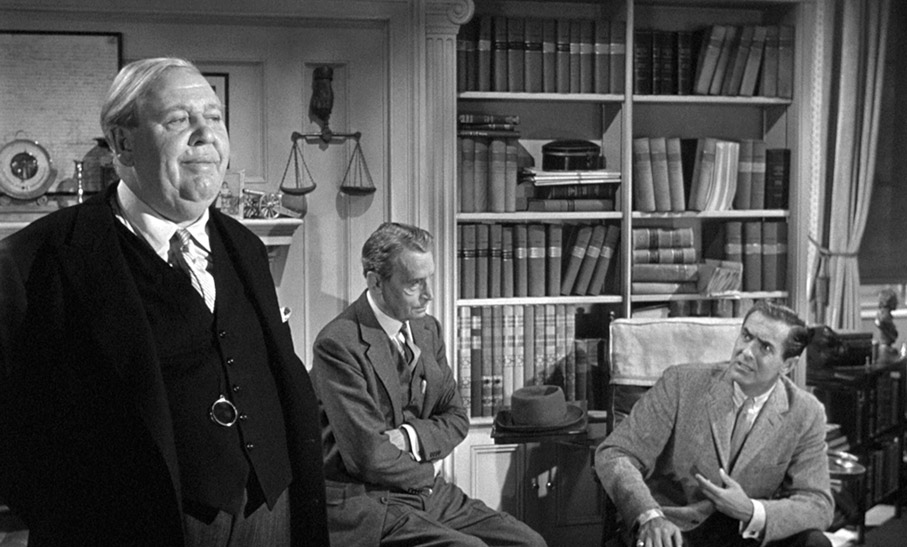
Interview with Neil Sinyard (24:35)
The learned Mr. Sinyard, who also provided a selected scene commentary on Indicator's recent release of Fritz Lang's Ministry of Fear, reveals his colours early on by describing Witness for the Prosecution as "one of Wilder's most brilliantly entertaining films," a statement I have absolutely no issue with. He provides information on co-screenwriter Harry Kurnitz, the changes made to Agatha Christie's source play and how they helped to transform it into a Billy Wilder film, one of the key twists (obviously, this should not be watched before the film, which is also true of the other extras here), the similarities to one of the director's most celebrated films, and more.
Billy Wilder on Witness for the Prosecution (13:40)
An extract from the wonderful Volker Schlöndorff and Gisela Grischow documentary, Billy, How Did You Do It?, which you can find in its 3-hour entirety on Eureka's Blu-ray of The Lost Weekend, which absolutely everyone who cares even a little about the films of Billy Wilder should own. The segment here inevitably deals primarily with Witness for the Prosecution and has some serious spoilers for newcomers, but is essential viewing if you've seen the film and also acts as an effective teaser for the full documentary. It's still available...
Original Theatrical Trailer (3:07)
"Climaxed by the ten most breath-stopping minutes you've ever lived," claims this interesting trailer that concludes with a direct address to camera by Laughton and the warning that no patrons will be seated during the final ten minutes of the film. If you're wondering why anyone would pay good money to only watch the final few minutes or so of a two-hour movie, it's worth remembering that back in the days of double-bills (at least in the UK), you could arrive and gain entrance at any point of either of the films being screened and stay until you were ready to leave, and if I regularly took advantage of this to watch films twice in succession on a single ticket. That said, if you did choose walk into a cinema screening a notoriously twisty tale like Witness for the Prosecution, then you deserve to be placed on one of those seats William Castle wired up with electric buzzers for The Tingler, covered in treacle and then washed down with a fire hose.
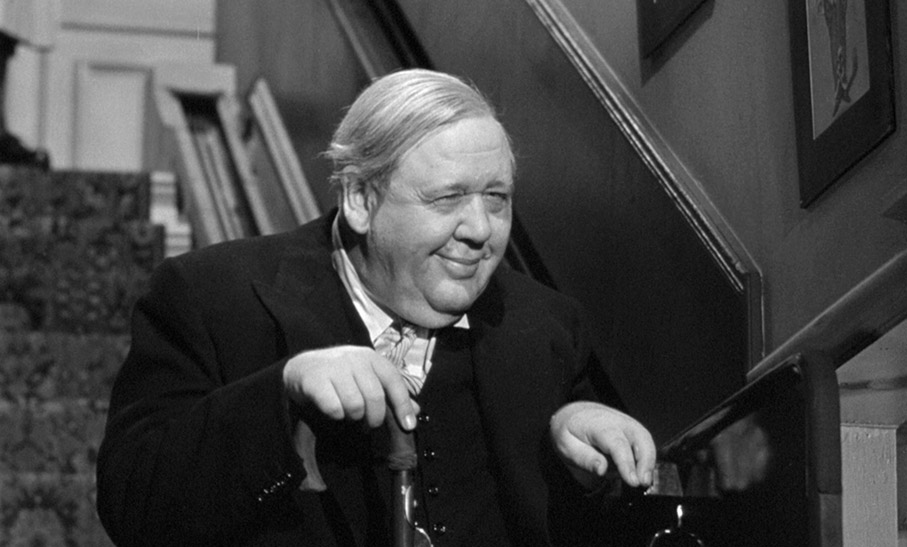
Booklet
Heading up the included booklet – after the first page spread of film credits, of course – is an authoritative essay on the film by reviewer and film historian Philip Kemp, who brings together information from a variety of sources and adds some pertinent observations of his own. Then we have a piece on Agatha Christie, Billy Wilder and the film itself by Sight & Sound regular Henry K. Miller, one that also looks at Raymond Chandler's early days as an author and his dismissal of the work of Christie and her British contemporaries. This is followed by a scan of the note sent by Christie to Billy Wilder praising his film adaptation of her work, the text of which has usefully been reproduced in type for those of us who struggle to clearly make out the author's handwriting. Finally, we have a generous collection of international posters for the film. I should note that the text for the articles is printed at a rakish angle, a stylistic tic that probably works fine in the booklet itself but for me made reading the supplied PDF on my iMac a bit of a pain in the neck, so to speak.
I'd be recommending Witness for the Prosecution for the sheer joy of Charles Laughton's wonderful performance alone, but there is so much more to enjoy here, in the excellent supporting cast, in a script bristling with witty exchanges and retorts, in Wilder's lively pacing and unobtrusive direction, and in a series of twists that really do catch you by surprise in the manner for which their original author is famous. It may not be making profound statements about guilt and innocence or the workings of the criminal justice system, but it remains a terrific entertainment that rewards multiple viewings, looks better than I've ever seen it on this new Masters of Cinema Blu-ray and is backed by some excellent special features. Highly recommended.
|